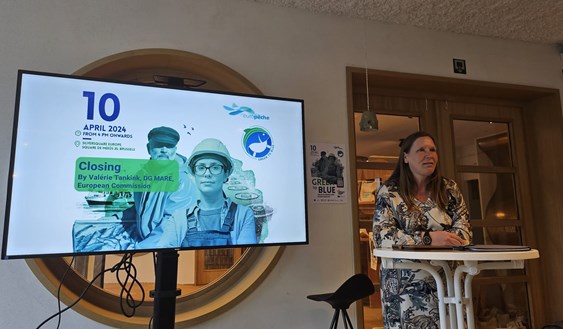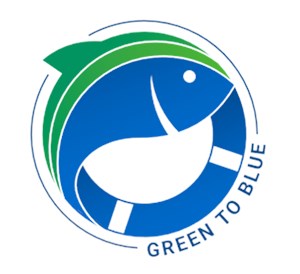GREEN TO BLUE Conference on Empowering Sentinels of the Sea for Sustainable Futures

Brussels, 11 April 2024 - The ‘GREEN TO BLUE: Upskilling for Sustainable Futures in Fisheries & Aquaculture’ Conference, held on April 10th, emerged as a pivotal event in advocating for sustainable practices within the fisheries and aquaculture sectors. Hosted by Europêche, this gathering marked the culmination of the European Erasmus+ project 'Green to Blue,' aimed at enhancing the professional skills of individuals working in these vital industries.
The conference featured a dynamic agenda, beginning with a keynote address by Kristine Krivmane from the European Commission's Directorate-General for Employment, Social Affairs & Inclusion. Krivmane underscored the significance of skills development in fostering sustainable futures, especially in the context of the European Year of Skills.
Constance Verlhac, a small-scale fisheries specialist from the General Fisheries Commission for the Mediterranean (GFCM) of the Food and Agriculture Organization of the United Nations (FAO), shed light on the challenges facing the Mediterranean region and strategies to cultivate sustainability and entrepreneurial engagement among fishers and fish farmers.
The event also showcased innovations in training and skills enhancement, with presentations from key stakeholders such as ENALEIA, the first fishing school dedicated to education on environmental sustainability in Greece. A session on results and future prospects showcased presentations from Erdogan University and Demetra Formazione, delving into the project’s skills framework that underpins the training programme and offering actionable recommendations to aid the futures of the fisheries and aquaculture sectors.
A highlight of the conference was the roundtable discussion on ‘Fishing and Farming in the Era of Sustainability’, moderated by Ilias Grampas from the European Parliament Intergroup on Climate Change, Biodiversity, and Sustainable Development. After valuable insights from the European Transport Workers’ Federation (ETF) by Andrea Albertazzi on the changes of the fisheries workers profession in face of environmental sustainability and the energy transition, distinguished panellists engaged in a dialogue on the challenges and opportunities in promoting environmental educational programmes within fishing and fisherfolk communities

In her concluding remarks, Valérie Tankink from the European Commission's Directorate-General for Maritime Affairs and Fisheries underscored the importance of sustainable practices in steering the blue sector towards a brighter, more resilient future.
The conference called to action, accenting the significance of policy coherence and coordination to address the interconnected challenges of environmental conservation, economic prosperity, and social equity. Policymakers must effectively address issues such as skills gaps, generational renewal, and career prospects, even more in the current uncertain geopolitical and socio-economic climate. The event underscored the value of enabling competencies among fishers and fish farmers, positioning them as sustainable entrepreneurs committed to the well-being of our seas. Furthermore, recognising the value of non-formal learning in certifying skills and competencies acquired through practical experience, and participation in novel educational activities is crucial for promoting continuous professional development within the fisheries and aquaculture sectors.
About the project
Stakeholders in the consortium conducted training pilots across the Mediterranean: Croatia, Greece, Italy, Turkey, and France. Hereby orienting adults working in the maritime sector towards a sustainable use of marine resources, in particular through awareness of all the actors around the concept of ‘preservation of the sea’, to generate a new figure of ‘sentinel of the sea’ of fishers and fish farmers. The consortium formulated a training programme structured to be flexible and adaptable to their daily work. It includes modules covering marine ecology, fisheries and aquaculture management, plastic pollution, climate change, and effective communication and collaboration strategies. It is unique in the sense that the course jointly trains fishers and aquaculture operators in the Mediterranean Region & decision makers and researchers related to the sectors.
Alongside the training programme, the project provides guidelines for trainers and governments and a skills framework as a complete picture of skills professionals from the fisheries and aquaculture sector should have to increasingly include the theme of sustainability understood in its various meanings. All efforts combined generated valuable insights, messages, and pressing calls reflected in the consortium's guidelines for reference.


Ends
For press contact:
Rosalie Tukker, Senior Policy Advisor of Europêche: +32 2 230 48 48 rosalie.tukker@europeche.org
Sources: Europeche